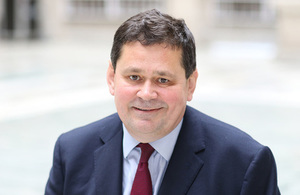The United Kingdom aligns itself with the statement made by the EU. Allow me to add the following in our national capacity.
Mr Chair,
The UK remains committed to a world without nuclear weapons, with undiminished security for all, and to the Nuclear Non-Proliferation Treaty. The 2020 Review Conference, on the 50th anniversary of the Treaty’s entry into force, provides an opportunity to celebrate its successes and come together to strengthen its future.
The Treaty and the IAEA safeguards that underpin it have helped to make us safer and more prosperous. They have extended the benefits of the peaceful uses of nuclear energy, provided a framework for substantial disarmament and minimised the proliferation of nuclear weapons.
Our commitment to the step-by-step approach to nuclear disarmament under the NPT remains undiminished. That commitment is not just rhetorical; we have demonstrated it by our actions over the years.
While the UK’s independent nuclear deterrent remains essential to our security today, and will do so for as long as the global security situation demands, it is maintained at a minimum credible level. We have reduced our deterrent to a single delivery system, and our operationally available warheads to no more than 120, of which just 40 are deployed. We also remain committed to reducing our overall stockpile to no more than 180 warheads by the next decade.
The ongoing programme to maintain and renew elements of our nuclear deterrent capability to ensure its continued safety and reliability is a necessary aspect of being a responsible Nuclear Weapon State, and is fully consistent with our obligations under Article VI of the NPT
The UK continues to support the Comprehensive Nuclear-Test-Ban Treaty and Organisation, and the start and early conclusion of negotiations on a Fissile Material Cut-Off Treaty in the Conference on Disarmament. We have maintained a voluntary moratorium on the production of fissile material for use in nuclear weapons or other explosive nuclear devices since 1995.
The UK contributes actively to work on nuclear disarmament verification, including through international initiatives such as the IPNDV and the Quad Partnership with Sweden, Norway and the US. In that regard we are proud to co-sponsor resolution L.22 on Nuclear Disarmament Verification, which we commend to the Committee.
The UK also welcomes other efforts to explore realistic paths to nuclear disarmament, including the United States’ Creating the Environment for Nuclear Disarmament initiative and Sweden’s Stepping Stones initiative.
We are also committed to increasing transparency, to the extent possible, and to improving our reporting on our NPT obligations and undertakings.
The UK does not, however, intend to support, sign or ratify the Treaty on the Prohibition of Nuclear Weapons. The Ban Treaty risks undermining the NPT, ignores the security environment and does not address the technical and procedural challenges that must be overcome to achieve nuclear disarmament in a secure and responsible manner.
Mr Chair,
At the same time, we must acknowledge the serious challenges that exist in the security environment.
Russia’s decision to continue to develop and deploy destabilising new nuclear capabilities threatens global security. Earlier this year, their decision to deploy a prohibited missile system led to the collapse of the Intermediate-range Nuclear Forces Treaty. We regret that Russia showed no willingness and took no demonstrable steps to return to compliance with its international obligations. Russia bears sole responsibility for the Treaty’s demise.
We remain committed to the Joint Comprehensive Plan of Action and as such are deeply concerned by Iran’s moves to reduce nuclear compliance. We urge Iran to reverse its actions and adhere fully to its commitments. We are working closely with partners on diplomatic efforts to engage Iran on negotiations for a long-term framework for its nuclear programme as well as on its destabilising regional activity.
North Korea’s nuclear programme poses a threat to regional and global security and the integrity of the NPT regime. We urge North Korea to engage in further dialogue to decrease tensions on the Korean Peninsula and to undertake complete, verifiable and irreversible denuclearisation.
It is against the backdrop of this challenging security environment that the NPT remains so important. It is a fundamental pillar of international security and the only framework we have to limit nuclear proliferation and pave the way for a world without nuclear weapons. That is why the UK continues to campaign for the universalisation of the NPT. As the 2020 Review Conference approaches, we remain determined to work with partners across the international community to strengthen the NPT that benefits us all.

